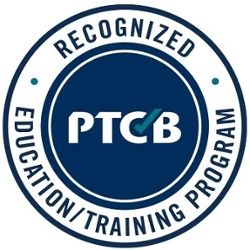If you’ve ever been to a community drugstore then you’ve likely interacted with a pharmacy technician. These health professionals make up the majority of the pharmacy team and handle much of the pharmacy’s day-to-day operations. If you’re considering a career in healthcare, have a keen attention to detail, and are interested in science, becoming a pharmacy technician might be the perfect fit.
In this guide, we’ll cover what pharmacy technicians do, where they work, and their job outlook and salary information.
What is a pharmacy technician?
Pharmacy technicians are healthcare professionals who work alongside pharmacists to dispense medications and provide patient care. While pharmacists are responsible for patient counseling and the final check of prescriptions, it’s pharmacy technicians who prepare medications, interact with patients to gather information, manage inventory, and handle insurance claims. In short, they’re the backbone of a pharmacy’s operations.
What does a pharmacy technician do?
Pharmacy technicians help pharmacists with the technical tasks of operating a pharmacy and filling prescriptions. The exact duties vary depending on the type of pharmacy, state regulations, and the technician’s experience level. Some key responsibilities include:
Where do pharmacy technicians work?

You might initially picture a pharmacy technician working primarily in a neighborhood drugstore or an independent pharmacy. While that’s a common and highly visible setting, pharmacy technicians actually work in a wide range of healthcare environments.
In hospitals and clinics, pharmacy technicians often work behind the scenes to ensure that each patient care unit has the correct medications at the right time. They may assist with preparing IV solutions, maintaining automated dispensing machines, and collaborating closely with pharmacists to confirm that medication orders are accurate.
Pharmacy technicians also work in long-term care and assisted living facilities. In these settings, they collaborate with pharmacists, physicians, and nursing staff to ensure that patients receive their prescriptions promptly and accurately.
Each setting offers a unique work environment, with different types of patient interaction and professional responsibilities. While a retail pharmacy role may emphasize front-facing customer service, other positions may be more clinically oriented and operate mainly behind the scenes. In all cases, pharmacy technicians are vital in ensuring patients can access the medications they need.
Training and licensing requirements
You'll need to obtain a license before you can begin working as a pharmacy technician in most states. Since each state’s board of pharmacy sets local standards, the exact requirements can vary. Generally, you’ll need to pass a criminal background check and have either a high school diploma or a GED (most states allow current high school students to also get licensed).
Many states also require pharmacy technicians to earn a certification from the Pharmacy Technician Certification Board (PTCB). This certification demonstrates that you understand medications and can safely work in a pharmacy setting. To become certified, you must pass the Pharmacy Technician Certification Exam (PTCE).
To sit for the PTCE, you’ll typically need to complete a PTCB-recognized training program. These programs are designed to help you prepare for the exam and lay the groundwork for your future career. You can find approved programs online or in person, allowing you the flexibility to choose a format that best suits your learning style. If you’ve already worked in a pharmacy and have 500 hours or more of documented experience, you can skip the formal training requirement and still qualify to take the exam.
Since regulations aren’t the same nationwide, you’ll need to verify your state’s specific licensing requirements with your board of pharmacy. Our State Requirements Guide can help you get started.
Many states also require pharmacy technicians to earn a certification from the Pharmacy Technician Certification Board (PTCB). This certification demonstrates that you understand medications and can safely work in a pharmacy setting. To become certified, you must pass the Pharmacy Technician Certification Exam (PTCE).
To sit for the PTCE, you’ll typically need to complete a PTCB-recognized training program. These programs are designed to help you prepare for the exam and lay the groundwork for your future career. You can find approved programs online or in person, allowing you the flexibility to choose a format that best suits your learning style. If you’ve already worked in a pharmacy and have 500 hours or more of documented experience, you can skip the formal training requirement and still qualify to take the exam.
Since regulations aren’t the same nationwide, you’ll need to verify your state’s specific licensing requirements with your board of pharmacy. Our State Requirements Guide can help you get started.
Job outlook and salaries
The demand for pharmacy technicians has been rising due to an aging population requiring more prescription medications and the growth of pharmacy services beyond just dispensing drugs.
Job growth
Salary expectations
A rewarding career
Working as a pharmacy technician offers a competitive salary and strong prospects for job growth. A key benefit of this profession is the chance to work in a variety of settings and handle a wide range of responsibilities, which keeps the work engaging and interesting. Additionally, the steady demand for prescription medications ensures that pharmacy technicians remain vital to the healthcare system—even during economic downturns. This level of job stability provides peace of mind and a reliable career path.
Beyond these practical perks, a healthcare career brings prestige and purpose. Each day, pharmacy staff make a meaningful difference in patients’ lives, helping them improve their health and well-being.
Beyond these practical perks, a healthcare career brings prestige and purpose. Each day, pharmacy staff make a meaningful difference in patients’ lives, helping them improve their health and well-being.
How Pharmacy Technician Academy Can Help

At Pharmacy Technician Academy, we’re dedicated to helping you achieve certification and succeed as a pharmacy technician. Our 1st Pass CPhT Course is a recognized program by the PTCB and designed to thoroughly prepare you for the Pharmacy Technician Certification Exam (PTCE).
By completing the 1st Pass CPhT Course, you’ll meet the PTCB’s eligibility requirements to take the certification exam, even if you don’t have prior pharmacy experience. The course is structured to cover all the essential topics tested on the PTCE, including medication basics, pharmacy law, patient safety, and more—giving you the knowledge and confidence needed to pass on your first attempt.
We’re here to support aspiring pharmacy technicians with everything they need to achieve certification and thrive in their careers.
Frequently asked questions
What is a pharmacy technician?
A pharmacy technician is a healthcare professional who works alongside a pharmacist to dispense medications, manage inventory, handle insurance claims, and perform various operational tasks. They help ensure that patients receive their prescriptions safely and efficiently.
What does a pharmacy technician do?
Pharmacy technicians measure, count, and package prescription medications; verify insurance coverage; maintain inventory; handle billing; and assist with patient inquiries. They are often the first point of contact in a pharmacy, helping to streamline operations so pharmacists can focus on the clinical aspects of patient care.
Where can pharmacy technicians work?
Pharmacy technicians can work in community drugstores, hospital pharmacies, clinics, long-term care facilities, mail-order pharmacies, and specialty pharmacies. Each setting offers a unique mix of responsibilities and patient interactions.
Do you need a license to be a pharmacy technician?
In most cases, yes. Licensing requirements vary by state, but most states require a high school diploma or GED and a clean background check. Additionally, many states require national certification from the Pharmacy Technician Certification Board (PTCB). For specific details about your state’s requirements, refer to our State Requirements Guide.

